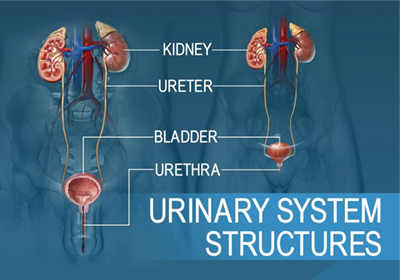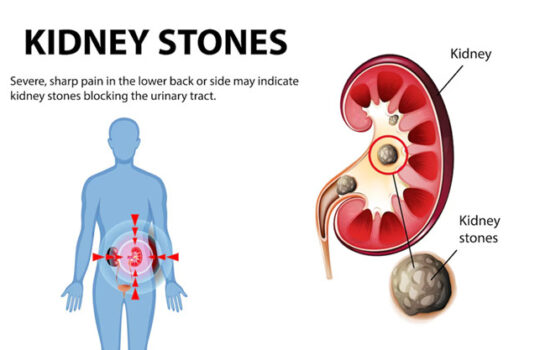Urinary System: Organs, Functions, Diseases & Treatment

The Human Urinary System: Organs, Functions, and Diseases Explained
Table of contents:
- What is the Urinary System? (Urinary System Meaning)
- Urinary System Organs and Their Functions
- Kidneys: The Body's Filters
- Ureters: The Connecting Tubes
- Bladder: The Storage Organ
- Urethra: The Exit Tube
- Common Urinary System Diseases and Disorders
- Urinary Tract Infections (UTI)
- Kidney Stones (Urinary Stones)
- Treatment and Management of Urinary Disorders
- The Role of Urepro Kit in Supporting Urinary Health
- Conclusion
- Disclaimer
What is the Urinary System? (Urinary System Meaning)
The urinary system specialized for the removal of liquid waste in the form of urine Regulation of water and electrolytes in body (sodium, potassium, calcium). Excretion of drugs, chemical and toxins.
Urinary System Organs and Their Functions
Urinary system has 5 parts (Organs)
- Kidney
- Ureter
- Urinary Bladder
- Urethra
- Prostrate
Kidneys: The Body's Filters (FUNCTIONS OF KIDNEY)
Our kidneys are the important part of our excretory system. Its primary function is:-
1. Regulation of water and electrolytes in body (sodium, potassium, calcium).
2. Excretion of waste products of metabolism
3. Regulation of the acid-base homeostasis of blood
4. Excretion of drugs, chemical and toxins
Ureters: The Connecting Tubes
Ureters carry the urine from the kidneys to the urinary bladder; The ureters contribute to maintaining the body's balance of fluids and electrolytes.
Bladder: The Storage Organ (FUNCTION OF URINARY BLADDER)
It is a muscular structure and storage organ for urine received from both kidneys. It is continue as urethra, at the bladder neck urethra surrounded by prostate gland. Normal prostate size is necessary for smooth outflow of urine.
Urethra: The Exit Tube
During the urination urethra serves as a passage for urine to exit.
Common Urinary System Diseases and Disorders
Three common urinary system diseases-
1. Urinary Tract Infection (UTI)
2. Urinary stone
3. Enlarged prostate-benign prostatic hyperplasia (BPH)
Urinary Tract Infections (UTI)
Urinary Tract Infection (UTI) is an infection of the urinary system, which includes the kidneys, ureters, bladder, and urethra. These infections typically occur when bacteria, most often from the digestive tract like E. coli, enter the urethra and cause inflammation. Frequent urination, painful or burning urination, cloudy & smelling urine, blood in urine, urgency or frequency of urine all are common symptoms of urinary tract infection (UTI)
Kidney Stones (Urinary Stones)
It is an excruciating painful condition often described as one of the strongest pain sensations.
1. 3rd most common affliction of the urinary tract after UTI and BPH
2. In India more than 150 million people experienced stone’s pain once or multiple times in their life
3. Mainly disease of young and middle age
4. 50% of patients experience recurrent stone formation within 5 years
5. Although more common in males but almost equally affects females
6. Most of the stone disease can be treated with medicine and diet modification
TYPE OF STONES
- Calcium stone (most common)
- Uric acid stone (less than 5%)
- Struvite stone (MAP stone)
- Cystine stone

SYMPTOMS OF STONE
- Pain-sharp, severe, acute colicky pain starting from flank (back) and radiate to lower abdomen or genitalia. OR Dull aching pain at back
- Hematuria (blood in urine)
- Nausea and vomiting
- Persistent urine burning
- Fever if stone causes obstruction and infection
- Cloudy or foul-smelling urine
- Painful urination or inability to pass urine

PROCESS OF STONE FORMATION
Renal stones are the polycrystalline aggregates composed of varying amount of crystalloid and organic matrix.
Stone formation requires super saturated and stagnant urine. Saturation of urine is decided by, PH of urine, ionic (calcium, oxalate, uric acid, phosphate, sodium) concentration in urine and concentration of natural stone inhibitors (citrate, magnesium, sulfate) in urine. Stagnation of urine occurs in obstruction of outflow from kidney, in voiding dysfunction, in enlarged prostrate.
Stone formation occurs when PH of urine get disturbed, urinary flow get disturbed, ionic concentration increased in urine so solubility of urine decreases and crystal formation starts.
Multiple steps are involved in crystal formation like Nucleation, growth, aggregation. A crystal of one type promotes growth of other type of crystal, Ultimately these crystals form large stone incapable of passing.
RISK FACTORS OF STONE FORMATION
- Increased crystal concentration in urine
- Increased intake of calcium and sodium
- Bowel disorders and metabolic disorders
- Increased intake of purines
- Gout, malignant conditions
- Inborn errors
- High intake of meat and dairy products
- Sudden weight loss
- Low fluid intake
- Stasis of urine flow
- Long term foreign body like catheter, DJ stent
- Hot and dry climate
- Family history of stone
- Industrialization
- Physical inactivity
- Recurrent non-specific UTI

Treatment and Management of Urinary Disorders
AIM OF TREATMENT
- To get relief from stone pain
- To reduce the chances of recurrent stone formation
- To reduce the need of surgery
- To get relief from blood in urine, urinary burning
- To improve quality of life of a stone sufferer
HOW TO ACHIEVE OUR GOAL (RECURRENT STONE TO NO STONE)
- By making the urine under saturated, more soluble
- By maintaining hydration of kidney
- By preventing stasis of urine
- By preventing formation of large obstructing crystals
- By decreasing concentration of ions in urine
- By increasing concentration of stone inhibitors
- By decreasing intake of meat, dairy product, calcium supplements, high salt, purines
- By encouraging fluid intake
- By avoiding long term foreign body
- By encouraging physical activity
- By preventing recurrent UTI
- By prophylactic treatment for recurrent stone formation
MECHANISM TO ACHIEVE GOAL BY MEDICAL TREATMENT
Any medicine which
- Discourages crystal formation and causes disintegration and fragmentation of crystals
- Causes early expulsion of small stones
- Decreases the ionic excretion
- Increases stone inhibitors in urine
- Treats UTI at same time
- Causes diuresis to make urine under saturated
- Improves outflow of urine
- Makes urine more soluble
- Most of the stones occur in acidic urine so makes urine alkaline
- Prevents recurrent stone formation by inhibiting initial crystal deposition and subsequent growth of stone and by correcting crystalloid-colloid imbalance
(RECURRENT STONE TO NO STONE)
Our motive — Healthy kidney with pain free life for all for corrective and preventive management of stone inhibitor, stone smasher, stone flusher Since last 22 years we are serving humanity
- Urepro kit has permissive role in corrective and preventive management of urinary stone exerts double strength at same time.
- Urepro kit is one of the most trusted and tested brands for renal (urinary) stone provides non-surgical option and hospitalization is not required during treatment.
- Urepro kit is a safe, herbal formulation having different vital herbs in an appropriate combination.
- Urepro kit is most effective, affordable, fast acting, palatable medicine for urinary stone without any side effects.
- Urepro kit therapy is very convenient and can be taken during your daily work routine.
- Because of complexity of renal stone multiple doses of urepro kit can be taken.
Urepro kit acts by
- Anti-lithogenic and anti-calcifying property
- Stone disintegration and litholytic property
- PH regulation
- Diuretic action
- Anti-microbial action
- Anti-inflammatory property
- Increasing concentration of stone inhibitors
- Making urine more soluble by its alkalinizing property
- Nephro- protective
- Improving tone of musculature
- Improving outflow
- Making urine unfavorable for micro-organism growth
BENEFITS OF UREPRO KIT
- Relives pain of urinary stone
- Relives symptoms of UTI
- Improves kidney function
- Prevents recurrence of urinary stone and UTI
INDICATIONS OF UREPRO KIT
- Urinary calculi
- Recurrent urinary calculi
- Non-specific UTI
- Dysuria and burning micturation
SAFETY PROFILE OF UREPRO KIT
It is a completely safe herbal medicine
ADVERSE EFFECTS OF UREPRO KIT
No known side effects
Conclusion
It is very difficult condition to suffer from urinary disorder problem or kidney stone problem, but knowing about them and taking precautions can be useful. Proper fluid or water intake, proper hygiene maintenance, dietary change and exploring natural remedies can reduce instances of these diseases, thereby enhancing quality of life.
If you are having kidney stone or urinary disorder problems, consider incorporating Ayurvedic options such as Urepro kit by Goelar Health Group into your daily routine. THAT’s a natural way of supporting your urinary system health.
Disclaimer:
This article should not be taken as any form of medical advice, instead, consult a professional. Always seek medical guidance before using or diagnosing any patient condition.
FAQ
What are the symptoms of a urinary tract infection (UTI)?
Ans- The symptoms of urinary tract infection are Frequent urination a condition in which there is a strong need to pee, Painful or hotness upon urination is referred to as pain or burning, both cloudy urine and foul-smelling urine may look like your own pee, blood in urine.
What causes kidney stones in the urinary system?
Ans- Low fluid intake, Stasis of urine flow, long term foreign body like catheter, Hot and dry climate, Recurrent Urine infection are main causes to make kidney stones in urinary system.
How do the kidneys function in the urinary system?
Ans-the kidneys act as filters that remove waste products, excess fluid, and electrolytes from the blood, producing urine. Regulation of water and electrolytes in body (sodium, potassium, calcium). Excretion of drugs, chemical and toxins.
What is the difference between urinary system and excretory system?
Ans-the urinary system (kidneys, ureters, bladder, and urethra) specialized for the removal of liquid waste in the form of urine. The excretory system includes the urinary system but also other organs like the skin, lungs, and liver that eliminate different types of waste (sweat, carbon dioxide, and processed toxins) from the body.
What lifestyle changes help maintain a healthy urinary system?
Ans- By decreasing intake of meat, dairy product, calcium supplements, high salt, purines. By encouraging fluid intake, by encouraging physical activity.
What is the meaning of urinary system in simple terms?
Ans- The urinary system has five parts included Kidney, ureter, urinary bladder, urethra, prostate specialized for the removal of liquid waste in the form of urine
About Dr. Kalpit Acharya
- Kalpit Acharya is a dedicated and passionate Ayush Surgeon, with expertise in various surgical procedures including Abdominal surgeries & Ano rectal surgeries, wound management and Ayurvedic para-surgical procedures. Combining his clinical expertise with a strong academic foundation in M.S. General Surgery (Shalya Tantra).
- He has achieved notable recognition, including winning prizes in prestigious competitions like SANGAM 2024 @ IIT BOMBAY and AAVISHKAR 2024. Additionally, Dr. Acharya was awarded for his research in the field of Ayurveda and modern medicine at IIT Bombay, IIT Delhi, and ACTREC TMC.
- Dr. Acharya is committed to providing Surgical & holistic care that addresses the physical, mental, and spiritual well-being of his patients through the integration of Ayurvedic principles and modern medical knowledge.










